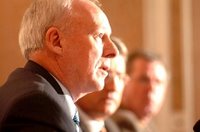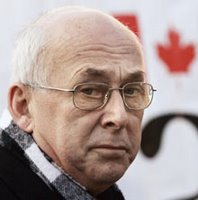Just to help keep track of the fibre story, following is a timeline of broadband-related announcements since October 2003. Some additional comments related to the GRAP deal announced on 02 November come from comments made by the Premier or innovation minister Trevor Taylor since then.
A few points leap out. Further information would clarify some of the discrepancies or unexplained gaps.
1. This project may be a lot younger than we have been told. If the Persona proposal was made to government 18 months before it was approved, it seems to have been largely ignored until June/July 2006. It was then met with a flurry of activity, rejected twice in the space of two months and then lay idle until the Aliant fire. EWA noted the short time-span it was given in which to assess the proposal.
According to Trevor Taylor in the House of Assembly, there were only eight meetings, in total on the project over 18 months that involved some representatives of the companies making the pitch. The Premier never met with anyone on the proposal, according to Taylor, nor did Taylor's predecessor Kathy Dunderdale.
Taylor himself acknowledges having met once with Persona president Dean Macdonald on the proposal and twice with Persona's chief operating officer Paul Hatcher.
In addition, government officials met three times with Macdonald, four times with Hatcher and once with representatives of MTS Allstream.
Even allowing for Taylor having a faulty memory this is not a large number of meetings over 18 months; some of the meetings may be duplicates (i.e. did Taylor meet with Macdonald and Hatcher at the same time and along with other officials?) It is extremely odd that Dunderdale did not meet at all with any of the proponents despite having this proposal in her department for over a year. As well, it is extremely unusual that no action took place on this proposal until
after Dunderdale was moved to another department.
The subsequent communications cock-ups - acknowledged by Taylor and the lack of specific benefits documented by third parties would be explained by a proposal that either was submitted and approved quickly or that was left laying about and hastily approved.
Note that the estimate of 50% savings used by the Premier to arrive at the $400 million figure is identified by EWA as being a verbal estimate by Persona. It has not been verified.
Add it all up and one can only conclude either that the proposal was not received by the provincial government until some time in mid-2006 (contrary to government claims) or that it was received, ignored for over a year and then hastily (sloppily?) reviewed and approved in less than four months. Either way, the implications do not speak highly of government's management processes.
2. Provincial and federal financial involvement in the project is larger than revealed. The $30 million project referred to by Persona's Paul Hatcher after the Aliant fire appears to be the joint federal/provincial/Persona initiative to expand broadband access under the CDLI program. As such, the provincial government has actually committed a total of $20 million to this, while the federal government has added $5.0 million to the $82 million total.
While Hatcher's comments seemed to indicate Persona had invested $30 million of its own, the company's actual involvement was on this portion was $19.9 million.
3. How convenient! The flurry of comment critical of Aliant seems to be convenient and involves a number of public individuals closely associated with the current provincial administration.
4. The missing strategy. The consultant RFP announced in November 2005 would have provided the strategic basis for any future broadband initiatives. What happened to it?
The Timeline
A. 31 March 2004: Budget 2004 includes $5.0 million for the department of Education's initiative to expand broadband access in schools. Another $1.2 million under Innovation, Trade and Rural Development (InTRD) to be used to leverage federal funding.
B. 15 June 2004: $50,000 from InTRD to help EXCITE Corp leverage funds from the federal BRAND initiative to expand broadband availability in Grand Falls-Windsor area.
C. 20 July 2004: Education issues request for proposals seeking a corporate match of $10 million funding from the federal and provincial governments to expand broadband in schools. RFP closes 30 April 2004.
D. 15 June 2004/
09 November 2004: InTRD announcement, Witless Bay. $4.0 million to expand broadband to 19 communities in Irish Loop region. Of the $4.0 million cost, 63% provided by Government of Canada. InTRD provided $285,000. [Note: This money was announced in June by the province and at a second announcement in
November. The southern route of the GRAP deal covers a portion of the Irish Loop project. The only communities in the southern GRAP route not covered by existing broadband expansion initiatives are on the south coast. ]
E. 02 July 2004: Unspecified level of provincial government support for SmartLabrador operations.
E.1. 22 September 2004: Premier Danny Williams announces appointment of Dean Macdonald and Ken Marshall to Newfoundland and Labrador Hydro board of directors.
F. 31 May 2005: Business minister and Premier Danny Williams announces Business Advisory Board. Members include Paul Hatcher and Dean Macdonald.
G. March-May 2005: Persona submits proposal for broadband connection to mainland, subsequently to involve Government, Rogers, Allstream and Persona. [Note: The timeframe on this is not exact. In several interviews and in the House of Assembly since 02 Nov 06, innovation minister Trevor Taylor referred to the proposal having been submitted about 18 months before it was approved.]
H. ??? 2005: Premier's chief of staff writes Minister InTRD (Kathy Dunderdale) assigning responsibility for the Persona proposal to InTRD. [Note: Based on comment from Taylor in House of Assembly. This suggests that the proposal was originally made to or received by the Premier either in capacity as Premier or as Minister of Business.]
 H.1 15 September 2005:
H.1 15 September 2005: $29.9 million announced by Government of Canada ($5.0 million), Government of Newfoundland and Labrador ($5.0 million) and Persona ($19.9 million), representing the results of RFP issued 20 July 2004.
I. 10 November 2005: Innovation minister Kathy Dunderdale announces "that the provincial government is reviewing all government telecommunications requirements with the intention of creating a province-wide advanced computer network." Announcement includes reference to national call for proposals for a consultant to "recommend an advanced network model that meets government's existing and anticipated future technology needs."
No results of this process are ever announced.
J. 21 June 2006: Electronic Warfare Associates contracted to provide assessment of GRAP/Persona proposal. [Note: This comes from a comment by EWA in the pages released by Taylor in the House of Assembly. Date on documents is 21 June 2006.]
J.1. 05 July 2006: Cabinet shuffle. Taylor appointed innovation minister; Dunderdale appointed natural resources minister; Kevin O'Brien replaces Danny Williams as business minister.
K. Late June or early July 2006: Premier Danny Williams rejects proposal based on concerns about connection between Premier and Persona senior officials. [Note: Both Williams and Taylor made reference to the proposal twice being rejected over issues of how the relationship between the Premier and some proponents would be perceived. Initially, Taylor indicated cabinet had rejected the proposal twice. On 14 Nov 06, the Premier claimed responsibility for these two decisions. The date estimates for K. And L. (below) come from comments by Taylor in answer to questions in the House of Assembly.]
L. Late July or early August 2006: Second rejection. [See note above]
M. 20 October 2006: Fire at Aliant causes temporary loss of telephone service.
N. 23-24 October 2006: Public
criticism of Aliant including Premier Williams, St. John's mayor Andy Wells, emergency measures boss Fred
Hollett and city commissioner Ron
Penney.
O. 26 October 2006: Cabinet approves GRAP proposal. [Note: Confirmed in House of Assembly by Trevor Taylor. Premier Williams gave several
interviews the day before indicating cabinet would be reviewing the proposal. Existence of the proposal was made public by Persona immediately after the Aliant fire and generally coincidental with the public criticism by the Premier, Mayor Wells and city commissioner Penney.]
P. 02 November 2006: GRAP deal announced by innovation minister Taylor and business minister Kevin O'Brien.
 Minister of Fisheries and Oceans Loyola Hearn to Gander airport authority:
Minister of Fisheries and Oceans Loyola Hearn to Gander airport authority: Minister of Natural Resources John Efford to Premier Danny Williams, on the Atlantic Accord:
Minister of Natural Resources John Efford to Premier Danny Williams, on the Atlantic Accord:




